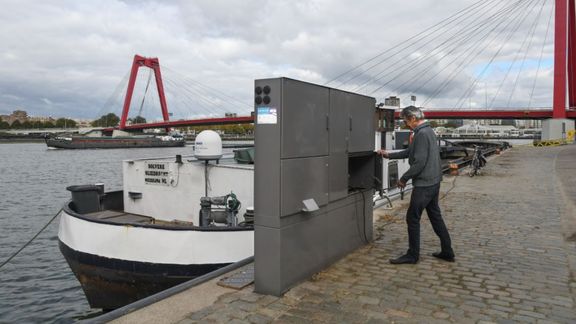Belgische en Nederlandse binnenvaarthavens willen één walstroomsysteem
Havenbedrijf Rotterdam, Havenbedrijf Amsterdam, North Sea Port Netherlands, Drechtsteden, Havenbedrijf Antwerpen en de Vlaamse Waterweg willen komen tot één uniform walstroomsysteem voor de binnenvaart en riviercruise. Dat is bevorderlijk voor het gebruikersgemak en stimuleert het gebruik van walstroom, een voorziening die stilliggende schepen van stroom voorziet. Uit naam van al die zogenoemde ‘Walstroompartijen’ is Havenbedrijf Rotterdam een Europese aanbesteding gestart die moet leiden tot een leverancier voor deze dienstverlening.

De aanbesteding past in het beleid van de ‘Walstroompartijen’ om de havengebieden in Nederland en België in balans te ontwikkelen. Dat betekent dat niet alleen geïnvesteerd wordt in economie, maar ook in verbetering van leefbaarheid en milieu. Duurzaamheid is daarbij het sleutelwoord. Gezamenlijk proberen overheden en bedrijfsleven meer te vervoeren over water en per trein in plaats van over de weg. Ook het beperken van uitstoot van CO2, stikstofoxide en fijnstof staat hoog op de agenda. Daarom is er veel onderzoek gedaan naar de toepassing van walstroom voor verschillende schepen en locaties. Dankzij walstroom is het voor de schippers mogelijk om zonder uitstoot (via een generator of hoofdmotor) maximaal van hun voorzieningen aan boord gebruik te kunnen maken.
De gezamenlijke doelstellingen hebben geleid tot een gezamenlijke aanpak waarbij het aanbod van walstroom zo eenvoudig en betrouwbaar mogelijk wordt gefaciliteerd. Het gaat daarbij primair om de dienstverlening voor storingen aan scheepszijde en de dienstverlening voor de levering en facturatie van de elektriciteit via walstroomkasten. De binnenvaart opereert in een internationale context. Het is dus wenselijk deze standaardisatie voor het gebruik van walstroom over de landsgrenzen heen te bewerkstellingen.
De mogelijkheid bestaat dat ook andere walstroom aanbiedende partijen aansluiten bij deze nieuwe overeenkomst.